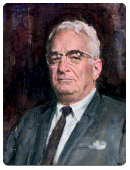Former justices

Justice E. Harold Hallows
Wisconsin Supreme Court Justice: 1958–1974Chief Justice: 1968–1974
Life: 1904–1974
"The legal profession, with its unlimited capacity for good, its high standards of ethical conduct, its grave responsibilities, its duties and its temptations, has no place for moral weaklings." – Justice E. Harold Hallows, speaking at University of Wisconsin Law School
E. Harold Hallows was born on April 20, 1904, in Fond du Lac, Wisconsin. He received his bachelor's degree in philosophy from Marquette University in 1926. As an undergraduate, a professor allowed him to lecture in an upper-level metaphysics class. He entered Columbia University Law School in 1926. However, he became ill with pneumonia and left. He returned to law school at the University of Chicago in 1927 where he graduated cum laude in 1930.
He was employed as an attorney in Milwaukee and taught at Marquette University Law School for 28 years. He educated hundreds of future lawyers, including Leo B. Hanley and Robert W. Hansen, who later served on the Wisconsin Supreme Court with Hallows. He was president of the Milwaukee Bar Association in 1948 and 1949 and president of the State Bar of Wisconsin in 1953.
In 1958, Hallows was appointed to the Wisconsin Supreme Court by Governor Vernon W. Thompson. He retained his seat on the Supreme Court in the 1959 and 1969 elections and became chief justice in 1968. Hallows participated in more than 5,000 decisions and wrote nearly 700 opinions. "Harold has created a stack of distinguished opinions. Reasoning is serious business to him, and he often shows the results of his experience as a teacher of law," said Justice Thomas E. Fairchild of Hallows in 1970.
Among his many noted opinions, he declared a law requiring children to attend school beyond 8th grade unconstitutional because it violated Amish indivduals' first amendment right guaranteeing freedom of religion. The U.S. Supreme Court upheld the decision. Hallows dissented to a state Supreme Court ruling that the father of a child born out of wedlock had no parental rights. His dissent became the basis for the U.S. Supreme Court's decision.
In April 1973, Hallows was diagnosed with acute leukemia. He left the Supreme Court in 1974 because of the mandatory retirement age then in effect. Hallows was married to Mary Vivian Hurley and had two children, Mary and Joseph. He died on September 11, 1974.

